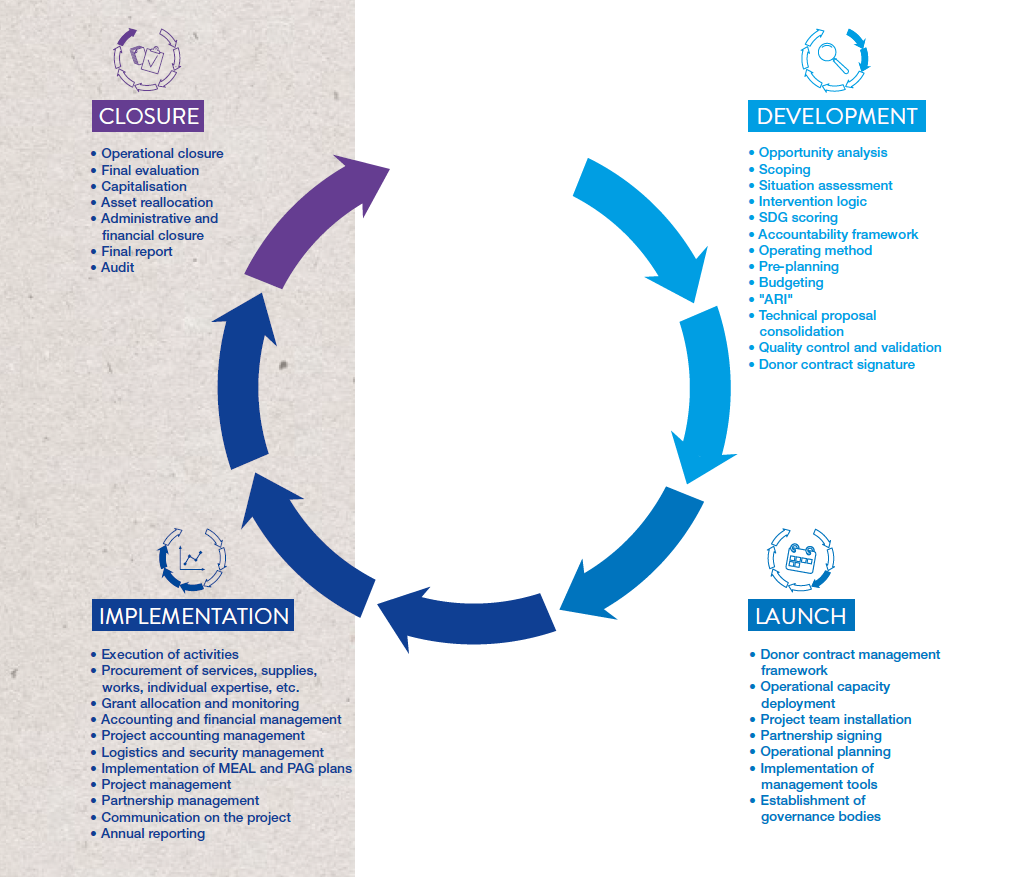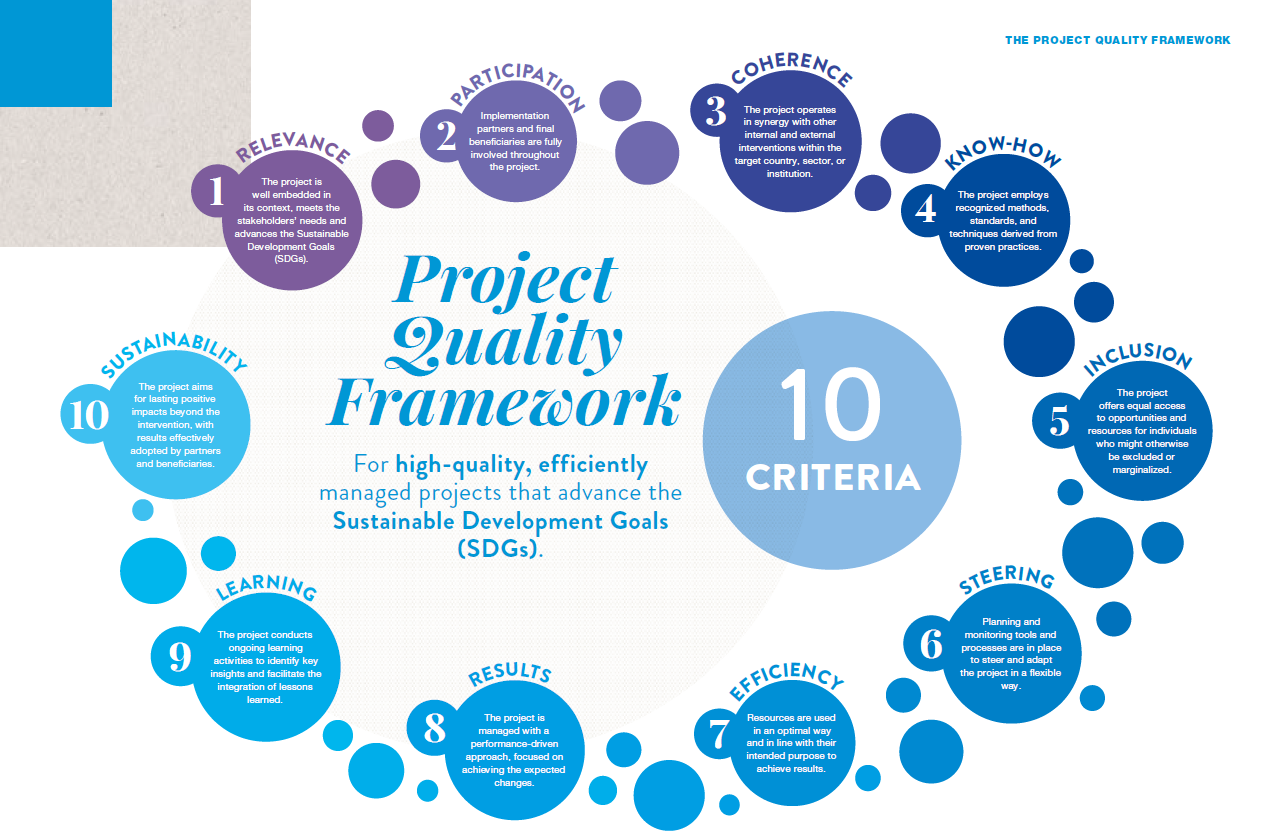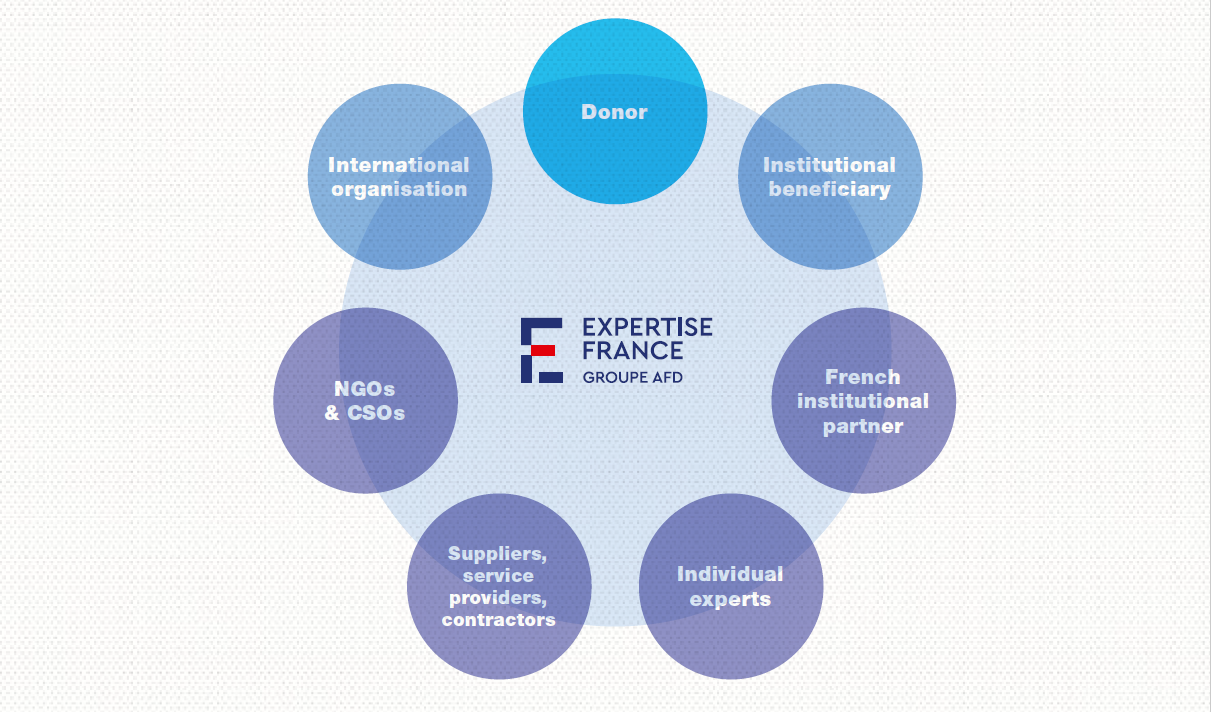Share the page
Project execution
Project execution is central to our mission and represents the core of our activity as France's international development cooperation agency. Our specialist knowledge of project execution is built on years of experience, high quality standards, and a methodology developed internally and applied across all our teams.
What is a project at Expertise France?
A project refers to a series of activities aligned with specific objectives, designed to achieve defined outcomes and impacts within a set timeframe. Our job is to design tailored, turnkey solutions that fully address the complex needs of our partner countries and organisations.
In other words, project execution is all the actions necessary to ensure the smooth running of a project. It involves specific management methods, techniques, and tools at each project stage to achieve defined outcomes and impacts, while staying within budget, deadlines and quality standards.
A project unfolds in four key phases:
- Development: In this phase, we analyse needs and challenges, specify objectives and expected outcomes, define our operational approach, and plan the financial, human, and technical resources required to execute and manage the project.
- Launch: This phase is when we create all the necessary conditions for optimal project execution. For example, we deploy appropriate human and technical resources, prepare tools and procedures, develop planning, monitoring and evaluation frameworks, and set up governance bodies.
- Execution: During this phase, we carry out all activities and perform services to meet expected outcomes and bring about tangible changes for our partner institutions, groups and populations.
- Closure: From an operations perspective, we ensure that all activities and deliverables have been completed. Administratively and financially, we verify that all contractual obligations have been met, perform audits, and submit a final project report.
Project cycle

Our 10 key criteria
We execute our projects against stringent quality standards. These are defined in our Project Framework document, which lists ten project quality criteria to be assessed throughout the project cycle covering strategic, operational, accountability and learning dimensions:
- Relevance - Identify underlying needs and problems and ensure the relevance of actions throughout the project.
- Participation - Involve partners in identifying problems and set up consultative and participatory processes from start to finish.
- Coherence - Identify potential synergies and foster stakeholder engagement with the project.
- Expertise - Identify the expertise, methods and techniques required for the project, train the project team, and deploy the necessary experts.
- Inclusion - Analyse social and gender inequalities and allocate resources to ensure the project reduces these inequalities instead of exacerbating them.
- Steering - Identify key project execution risks and set up an operational and budgetary planning framework.
- Efficiency - Realistically estimate costs and update them throughout the project to ensure the operational strategy chosen remains the most efficient.
- Results - Identify relevant indicators to measure changes and assess how well the expected results have been achieved.
- Learning - Integrate best practices from other projects and apply lessons learned.
- Sustainability - Identify expected long-term positive impacts and prepare appropriate continuity or exit strategies.
We also invest in team training and provide our project team with a practical Project Management Guide to aid them in every phase of the project. Monitoring and evaluation are systematically incorporated into projects to ensure optimal results and accountability.
Project framework

Our accountability approach
All our projects undergo strict controls to ensure transparency with stakeholders. To accurately assess project impact, we use predefined accountability indicators to measure performance:
THEMA indicators: We use 32 aggregate indicators across six main areas of action. These include cross-cutting focus areas such as gender equality. They also include health; human development; peace, stability and security; democratic, economic and financial governance; and climate, biodiversity and sustainable development.
COM indicators: These are based on our Contract of Objectives and Means, an agreement between Expertise France and the French government specifying our budget and strategic priorities for the coming years. The COM indicators cover about ten topics, one being gender equality.
Integrated and decentralised approach
We execute our projects based on an integrated approach and our decentralised organisation as an agency. We engage local multidisciplinary experts to ensure a strong local presence and to enhance operational efficiency and project agility.
Decentralising our agency also enables us to work more closely with our partners and to:
- Bring together a range of stakeholders from different backgrounds and areas of specialisation
- Operate in diverse cultural and security-sensitive environments
To achieve these aims, our staff are now deployed to our:
- Headquarters in Paris
- 11 in-country offices, each with 40 to 120 staff, in Comoros, Côte d’Ivoire, Guinea, Haiti, Lebanon/Jordan, Madagascar, Papua New Guinea, DRC, Rwanda, Tunisia/Libya, and Ukraine
- 10 regional offices in North Africa, West Africa, East Africa, Indian Ocean, Andes, Southern Cone and Caribbean, Southern Africa, Central America, South and Southeast Asia, as well as in the Balkans, Caucasus and Central Asia region.
Project stakeholders

European twinnings
As part of our project execution activities, we also manage collaboration between European institutions. This helps French ministries or other public bodies and state-owned enterprises to take part in development projects.
Twinnings are a key instrument of institutional cooperation, supporting reform in EU candidates and third-party countries. We contribute to institutional twinning in multiple ways:
- Twinning ownership
- HR, administrative, financial, and logistical management
- Familiarity with local stakeholders
- Technical management and deployment of technical experts
Study visits
Our services also include themed study visits to support partners in project development, provide technical teams with guidance in their work, and to promote French expertise in areas of excellence.
We regularly host foreign delegations in France, offering opportunities to better understand the organisation and functioning of French stakeholders (both central and decentralised), the organisation of various sectors, our partners’ roles and responsibilities, the results that have been achieved, achievements on the ground, etc.
Resources for download
FAQ - More about project execution
More information about project execution
Project execution refers to the operational phase during which the strategic plans of a project are implemented. It aims to achieve defined objectives using allocated human, technical, and financial resources within an approved schedule.
At Expertise France, project execution is built on three pillars: quality standards through the Project Framework, monitoring and evaluation; an integrated, decentralised approach that fosters, among other things, local partnerships and close ties with partner countries; and an accountability process based on indicators defined at the project planning stage.
Project execution follows a structured timeline reflecting the project cycle used by the agency:
- Development: We analyse needs and challenges, set objectives and results, define methods, and plan financial, human, and technical resources.
- Launch: We deploy appropriate human and technical resources (set up the project team, collect project-related data, design project methodology, and appoint a project manager), prepare tools and procedures (identify and allocate tasks), and develop planning and monitoring frameworks (project phases, timeline, progress reports). Additionally, we set up governance bodies.
- Execution: We execute the project, monitor budgets and progress, and adjust where needed.
- Closure: We draw up a final report, consolidate knowledge for dissemination, and carry out our assessment.
We use a variety of tools to help teams structure and manage project execution:
- Logical framework: structure objectives, expected results, and indicators
- A Monitoring, Evaluation, Accountability, and Learning (MEAL) system tracks performance regularly
- Retro planning sets a project timeline by working from the end date backwards
- Evaluation grids: internal or donor tools for quality alignment
- Project sheets: checklists, templates, terms of reference
- Document management systems (paper or digital) to ensure accessibility, traceability, and compliance in the event of audits by an administration, a private company, an organisation, etc.
Key figures
- 384 active projects
- 147 countries across 27 geographic regions
- 800 million euros in new projects agreed in 2024
- 162 new projects in 2024
